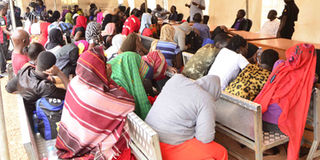Implement laws on human trafficking, Kadaga tells govt

Rescued. Some of the victims of human trafficking at the Ministry of Internal Affairs in Kampala after they were intercepted in Kenya enroute to Oman in September last year. PHOTO BY ALEX ESAGALA
What you need to know:
Ms Kadaga, while opening the consultative workshop on the Anti-Slavery Bill, 2018 at the Gold Tulip Hotel in Kampala yesterday, said it is not good for Uganda to sign international conversions and shelve them
kampala. The Speaker of Parliament, Ms Rebecca Kadaga, has called on government to domesticate international conventions on human trafficking and slavery so that the country is able to fight the crime that has affected many Ugandans.
Ms Kadaga, while opening the consultative workshop on the Anti-Slavery Bill, 2018 at the Gold Tulip Hotel in Kampala yesterday, said it is not good for Uganda to sign international conversions and shelve them.
“As a country, we have to wake up. We have not domesticated international conventions; I don’t know how many we have shelved. We go and sign such flourish conventions and come and put them in shelves,” she said.
“I think we are failing this country by not domesticating the conventions, especially the ones of the UN [United Nations],” Ms Kadaga added.
Conventions
Some of the conventions are the Protocol to Prevent, Suppress and Punish Trafficking in Persons, especially Women and Children, supplementing the United Nations Convention against Transnational Organised Crime, and, the Protocol against the Smuggling of Migrants by Land, Sea and Air, supplementing the United Nations Convention against Transnational Organised Crime.
Uganda on December 13, 2000 signed the two protocols when they were adopted by the UN General Assembly but is yet to domesticate them, nearly two decades later.
Ms Kadaga also said many Ugandans, who are victims of human trafficking, especially in the Middle East, have continued to suffer because of their poor attitude towards working with government structures. She said during a meeting with some of the Ugandans working in Dubai, United Arab Emirates, last year, she discovered that most of them do not want to associate with the nearest missions. “These Ugandans don’t know that through their passports, the President is requesting for their safe passage wherever they go. It is written in the passports. But there is a need to find solutions to the problem of grabbing their passports by employers,” Ms Kadaga said.
Without giving names she said some ministries have interest in the external labour recruitment agencies, which makes it difficult for them to supervise their activities.
Prof Parosha Chandran, the legal adviser to the Commonwealth Parliamentary Association in the United Kingdom, said most victims of slavery are those who aspire to acquire wealth from elsewhere due to poverty and lack of opportunities hence a need for African governments to find solutions to the prevailing problems.
About The Anti-Slavery Bill 2018
Soroti Municipality MP Herbert Ariko was granted leave of Parliament to draft a Private Member’s Bill titled ‘The Anti-Slavery Bill 2018’, which, if passed into law, will come up with stringent measures towards curbing modern day slavery. Mr Ariko told Daily Monitor yesterday that the current Trafficking in Persons (TIP) Act, 2009 only dwells on the illegal movement of people from one place to another but does not cater for resulting slavery when they finally reach their destinations.
“It is our duty to bring in a law that consolidates all legislations to do with slavery so that it becomes easy for implementation, especially by the judicial officers,” Mr Ariko said.
The Private Member’s Bill is expected to be tabled in Parliament before the end of June.




